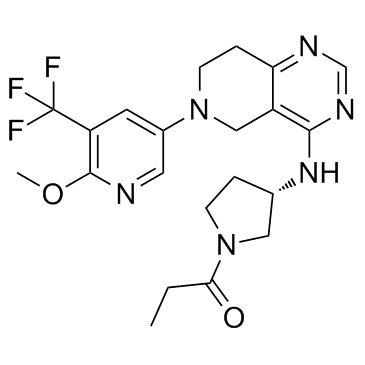1354690-24-6
| Name | 1-{(S)-3-[6-(6-methoxy-5-trifluoromethyl-pyridin-3-yl)-5,6,7,8-tetrahydro-pyrido[4,3-d]pyrimidin-4-ylamino]-pyrrolidin-1-yl}-propan-1-one |
|---|---|
| Synonyms |
1-{(S)-3-[6-(6-methoxy-5-trifluoromethyl-pyridin-3-yl)-5,6,7,8-tetrahydro-pyrido[4,3-d]pyrimidin-4-ylamino]-pyrrolidin-1-yl}propan-1-one
(S)-1-(3-(6-(6-Methoxy-5-(trifluoromethyl)pyridin-3-yl)-5,6,7,8-tetrahydropyrido[4,3-d]pyrimidin-4-ylamino)pyrrolidin-1-yl)propan-1-one {(S)-3-[6-(6-methoxy-5-trifluoromethyl-pyridin-3-yl)-5,6,7,8-tetrahydro-pyrido[4,3-d]pyrimidin-4-ylamino]-pyrrolidin-1-yl}-propan-1-one Leniolisib |
| Description | Leniolisib (CDZ173) is a potent and selective PI3Kδ inhibitor currently in phase II/III clinical trials for the treatment of immunodeficiency disorders. |
|---|---|
| Related Catalog | |
| Target |
PI3Kδ:11 nM (IC50) PI3Kα:280 nM (IC50) PI3Kβ:480 nM (IC50) PI3Kγ:2.57 μM (IC50) DNA-PK:880 nM (IC50) |
| In Vitro | Expression of APDS mutant p110δ in cell lines and patient-derived lymphocytes lead to increased pathway activity, measured as phosphorylation of AKT or S6, which is suppressed by leniolisib in a concentration dependent way[1]. |
| In Vivo | Oral leniolisib lead to a dose-dependent reduction in PI3K/AKT pathway activity and resolve the immune dysregulation with normalization of circulating transitional and naïve B cells and reduction in PD-1+CD4+ and senescent CD57+CD8+ T cells. After 12 weeks of treatment, all patients show amelioration of lymphoproliferation with lymph node sizes and spleen volumes reduced by 39% (mean, range 26-57%) and 40% (mean, range: 13-65%), respectively[1]. |
| References |
| Molecular Formula | C21H25F3N6O2 |
|---|---|
| Molecular Weight | 450.45700 |
| Exact Mass | 450.19900 |
| PSA | 83.48000 |
| LogP | 2.96040 |
| Storage condition | -20℃ |
